|
|
|
Sort Order |
|
|
|
Items / Page
|
|
|
|
|
|
|
| Srl | Item |
| 1 |
ID:
127778


|
|
|
|
|
| Publication |
2014.
|
| Summary/Abstract |
The state sector still plays an important role in China's economy. One of the key development phenomena characterizing the Chinese economy is the rapid ascendency of state-owned enterprises (SOEs) and the resurgence of the state. The strength of China's SOEs is projected in the centrally administrated state-owned enterprises (CSOEs). They are the backbone of the national economy, spearheading national economic development and Beijing's 'going-out' strategy. The CSOEs have expanded their reach and increased their power, domestically and globally. In seeking to boost local GDP growth, the eastern provinces in China have joined the western provinces in a fierce contest to attract investment from SOEs. Nevertheless, the rapid ascendency of the SOEs has brought many negative consequences for China's economic, social and political development by causing conflict with the market-oriented development direction of Chinese economic reform and hindering fair competition between state-owned and non-state-owned enterprises.
|
|
|
|
|
|
|
|
|
|
|
|
|
|
|
|
| 2 |
ID:
127776


|
|
|
|
|
| Publication |
2014.
|
| Summary/Abstract |
Economic integration in the Taiwan Strait has become increasingly stronger recently. Economic integration should have led to stronger political convergence. Why hasn't it occurred? I argue that democracy in Taiwan and the continuation of the single-party rule in China have created two very different social experiences. These different social experiences have formed two different identities. People in Taiwan are increasingly thinking of themselves as Taiwanese rather than Chinese. The growing level of popular nationalism in China has also altered the political identity of mainland Chinese. Such change could force Beijing to accommodate citizens' demand to act more toughly towards Taipei. Further political integration is still possible, but it would require another norm change, perhaps already in the making.
|
|
|
|
|
|
|
|
|
|
|
|
|
|
|
|
| 3 |
ID:
127771


|
|
|
|
|
| Publication |
2014.
|
| Summary/Abstract |
Fresh water has no substitute, and its availability has been declining sharply around the globe. In Asia, China's role as a multidirectional and transborder water provider is unmatched. Analysis of China's behavior towards its transboundary rivers is therefore pivotal. By examining three different case studies-the Mekong River in Southeast Asia, the Brahmaputra River in South Asia and the Irtysh and Ili Rivers in Central Asia-this article seeks to lay the theoretical groundwork for understanding China's behavior. It pits previously applied realist rationales against the more recent notion of desecuritization strategies and makes a case for the latter. While desecuritization implies non- or de-escalation, it does not necessarily mean genuine long-term cooperation. The future of Asia's shared waters may thus be a contentious one.
|
|
|
|
|
|
|
|
|
|
|
|
|
|
|
|
| 4 |
ID:
127772


|
|
|
|
|
| Publication |
2014.
|
| Summary/Abstract |
To curb price speculations and overheated investment in the real estate market, the mainland Chinese government has determined to tighten bank lending to the market in recent years, by resorting to administrative tools through specific real estate control policy. With hindsight, the market response seems to have invalidated the policy initiatives. This research is aimed at investigating the impediments to achieving the laudable policy objectives of using administrative credit controls. A series of research interviews with property practitioners unraveled prevalent evasive practices and illicit tactics adopted by developers to thwart policy effects. This study leads to a better understanding of the institutional backdrop behind the less-than-expected results of the real estate macro-control measures. To better steer the real estate market, effective monetary control requires both the government and industry to make concerted efforts and consistent headway towards a complete, transparent and responsive ensemble of institutional arrangements.
|
|
|
|
|
|
|
|
|
|
|
|
|
|
|
|
| 5 |
ID:
127773


|
|
|
|
|
| Publication |
2014.
|
| Summary/Abstract |
Since 1998, the Chinese housing market has played a fundamental role in driving macroeconomic stability and economic growth. This paper attempts to estimate the income elasticity of housing demand in Shanghai based on a household survey conducted by the National Bureau of Statistics of China in 2007. We utilize a two-stage model, which integrates analysis of both tenure choice and housing demand. Our findings indicate that both permanent and current income has significant influence on tenure choice in Shanghai, and that owner-occupiers' permanent income elasticity of housing demand in Shanghai is between 0.375 and 0.447. Our research also suggests that migrant homeowners have higher permanent income elasticity than Shanghai natives and that most Chinese households are liquidity constrained with regards to obtaining homeownership. We also find that permanent income elasticity increases with age. Finally, the existence of an urban-rural and regional difference is shown.
|
|
|
|
|
|
|
|
|
|
|
|
|
|
|
|
| 6 |
ID:
127774


|
|
|
|
|
| Publication |
2014.
|
| Summary/Abstract |
The Shanghai Cooperation Organization (SCO)-an organization interpreted in various ways-officially announced that it intended to ensure regional security by countering international terrorism, ethnic separatism and religious extremism. This article discerns the motivations of the SCO members, arguing that they have their respective, albeit occasionally mutual, interests and priorities. There is generally asymmetry of interests-the principal reason why the SCO's strategic situation is largely a suasion game between China and the members-with China demonstrating a greater interest in the SCO; moreover, the power asymmetry between China and the Central Asian members and the power equality between China and Russia further complicates the situation. This sophisticated relationship implies that despite some measurable results, the SCO faces tremendous challenges in becoming a well-established regional organization.
|
|
|
|
|
|
|
|
|
|
|
|
|
|
|
|
| 7 |
ID:
127779


|
|
|
|
|
| Publication |
2014.
|
| Summary/Abstract |
Congress elections are an important part of political-legal studies in China. The literature has covered the direct election process, voters' attitudes and behaviors, and Party-congress-government relations in Chinese elections. Based on on-site observations, interviews and first-hand documents, this article explores the process of indirect elections at the municipal level. This article examines the interaction among institutions taking part in the municipal congress elections. It also addresses how the social structure changes affect congress elections and deputy compositions. It reveals that an implicit function of the congress election is to co-opt new social groups and interests into the establishment. Such co-option is an adaptive strategy of the Party state in the reform era.
|
|
|
|
|
|
|
|
|
|
|
|
|
|
|
|
| 8 |
ID:
127777


|
|
|
|
|
| Publication |
2014.
|
| Summary/Abstract |
Starting from 2004, China's trading partners, in particular the United States, have increasingly utilized the World Trade Organization (WTO) dispute settlement system (DSS) to challenge China's trade-related measures. As a major player in world trade, how China responds to adverse rulings is not only important to its trading partners, but also for the future of the international trade regime. China has thus far held a relatively good compliance record when facing adverse panel and/or Appellate Body rulings, except for the recent delay in full compliance in China-Publications and Audiovisual Products. Through examining the factors affecting China's decision making when targeted in a WTO dispute, this article finds that, in general, China is highly motivated to comply with the WTO DSS due to the reputational costs of noncompliance. Nevertheless, the recent delay in compliance in China-Publications and Audiovisual Products also demonstrates that successful implementation could be impeded by certain politically influential interest groups, especially when the measure at dispute is politically sensitive.
|
|
|
|
|
|
|
|
|
|
|
|
|
|
|
|
| 9 |
ID:
127770


|
|
|
|
|
| Publication |
2014.
|
| Summary/Abstract |
China manages its transboundary rivers as a subset of its broader relations with other riparian states. This results in discernible differences in the way China approaches its international river systems. Although there is a limit to the extent of Chinese cooperation, in relative terms China is more cooperative in the Mekong than in the Brahmaputra. To China, Southeast Asian states are part of a hierarchical system where it stands at the apex. While problems exist, there are deep linkages between them, which help foster collaboration in the Mekong. India, which has greater power parity with China, is not part of China's hierarchical worldview. The territorial disputes and security dilemmas that characterize South Asian geopolitics further impede cooperation. Domestic considerations also impact on China's river policies. There is greater consensus among Chinese policymakers in managing the Mekong than the Brahmaputra, which explains the higher degree of clarity in Chinese policies towards the former compared to the latter.
|
|
|
|
|
|
|
|
|
|
|
|
|
|
|
|
| 10 |
ID:
127775


|
|
|
|
|
| Publication |
2014.
|
| Summary/Abstract |
This paper reviews the perceptions of the CA states (Kazakhstan, Kyrgyzstan, Tajikistan and Uzbekistan) towards the Shanghai Cooperation Organization (SCO) and conceptualises the CA states' motivations and concerns in engaging in cooperation within the SCO vis-à-vis China. The message that this paper aims to deliver is that, for the majority of the CA leadership and public, China within the SCO represents the CA states' 'other', with decolonising but increasingly dominating features. These perceptions of China in the CA region elucidate the ways in which China's involvement in Central Asia has a paradoxical and contradictory impact on the potential for the SCO to move beyond functionalism and towards the creation of a broader SCO identity. Consequently, the future of the SCO may be more limited than the West fears and Central Asia hopes.
|
|
|
|
|
|
|
|
|
|
|
|
|
|
|
|
|
|
|
|
|